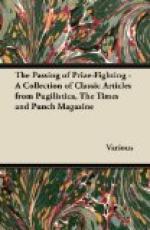Monday, October 25th.—Sir PHILIP LLOYD-GREAME, the newest recruit on the Treasury Bench, already answers Questions with all the assurance of the other LLOYD G. His readiness in referring the inquisitive to other Departments and in declining to go beyond his brief—witness his modest refusal to discuss in reply to a Supplementary Question the possibility of imposing a tariff in this country—suggests that somewhere behind the SPEAKER’S chair there must be a school for Under-Secretaries where the callow back-bencher is instructed in the arts and crafts required in the seats of the mighty.
For this purpose I can imagine no better instructor than the ATTORNEY-GENERAL, who combines scrupulous politeness with an icy precision of language. Take, for example, his treatment of Mr. PEMBERTON BILLING’S defiant inquiry if it would now be “compatible with the dignity of the Government” to say that there had never been any intention to bring the War-criminals to trial. “No,” replied Sir GORDON HEWART in his most pedagogic manner, “it cannot be compatible with anyone’s dignity to make a statement which is manifestly untrue.”
[Illustration: A GOVERNMENT RECRUIT.
Sir PHILIP LLOYD-GREAME.
Parliamentary Secretary to the Board of Trade.]
This week was to have been devoted, de die in diem, to getting on with the Government of Ireland Bill. But the malignant sprite that has hitherto foiled every effort to pacify Ireland again intervened, and the House found itself called upon to discuss the Emergency Powers Bill. The measure is a peace-time successor to D.O.R.A. (who in the opinion of the Government is getting a little passee) and, perhaps naturally, met with little approval. Mr. ASQUITH, while admitting that something of the kind might be required, took exception to the vagueness of its drafting. “What is ’substantial’?” he inquired. “Ask them another!” Mr. WILL THORNE joyfully interjected. “What is ’substantial’?” repeated the EX-PREMIER; whereupon the Coalition with one voice replied, “WILL THORNE.”
[Illustration: SOMETHING “SUBSTANTIAL.” Mr. WILL THORNE.]
With consummate skill the PRIME MINISTER managed to get the House out of its hostile mood and to satisfy the majority, at any rate, that the measure was neither provocative nor inopportune, but a necessary precaution against the possibility that “direct action” on the part of extra-Parliamentary bodies might confront the country with the alternatives of starvation or surrender.
Tuesday, October 26th.—In these troublous times the House gladly seizes the smallest occasion for merriment. There was great laughter when Colonel YATE, the politest of men, inadvertently referred to Sir ARCHIBALD WILLIAMSON as “the right honourable gent,” and it broke forth again when, in his anxiety to make no further slip, he addressed him tout court as “the right honourable.”




